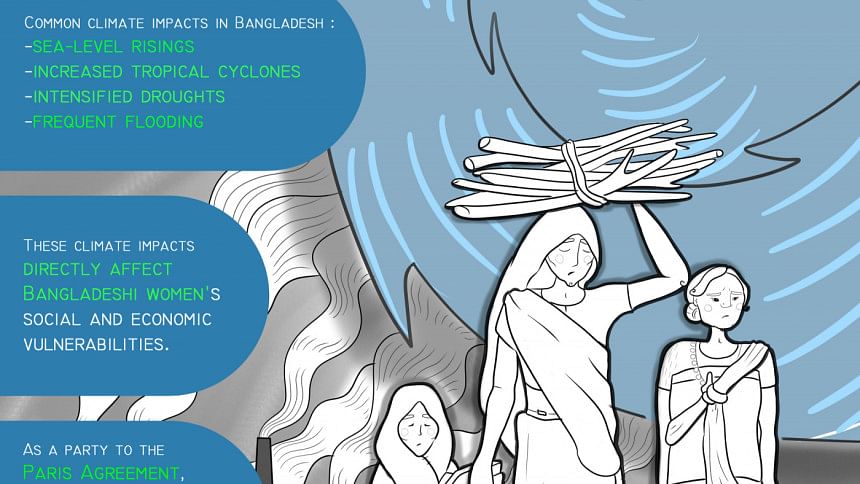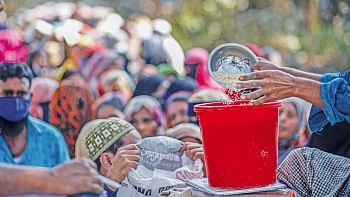Climate change and women in Bangladesh
Climate change is a global phenomenon that contributes to long term changes in the global climate and adversely affects both socio-economic systems and ecosystems. In collaboration with Ms Eshita Rahman and Ms Raihanatul Jannat, Think Legal Bangladesh has prepared an infographic on Climate Change and its impact on Women. This collaboration brought the perspectives of a woman illustrator and a woman academic together for Women's Day 2021. It depicts how climate change is both a global and local issue; and how the women of Bangladesh are especially vulnerable to impacts of climate change. From an elementary perspective, these two women seem distinctive with no inter-link between themselves, but the vast impact and symbiosis between climate change and women have been reflected from the illustration and the research conducted.
Climate change was defined in Article 1 of the United Nations Framework on Climate Change (UNFCCC) as a change of climate attributed directly or indirectly to human activity that alters the composition of the global atmosphere and which is in addition to natural climate variability observed over comparable periods. Bangladesh ranks 7th on the list of 10 countries most affected by climate change from 2000 to 2019 and faces a diverse range of climate impacts through sea-level risings, increased tropical cyclones, salinity inundation in arable lands, intensified droughts, precipitation variability, and frequent flooding.

Impacts of climate change also increases Bangladeshi women's social and economic vulnerabilities by directly impacting their food security, water consumption, and livelihood. Moreover, they are disproportionately affected in comparison to men in due to established societal norms and are consequently undermined in Bangladesh due to its traditional gender perspectives. As a party to the Paris Agreement 2015, Bangladesh has a legal obligation to adopt gender-responsive approach while focusing on adaptation to impacts of climate change through enhancing adaptive capacity and resilience; and reducing vulnerability, with a view to contributing to sustainable development.
Adaptation is the process through which societies can moderate or avoid harm from impacts of climate change by adjusting to the changing climate and its effects is one of the two central approaches in the international climate change process.
Even though it accounts for less than 0.35 per cent of global greenhouse gas emissions, Bangladesh was the first South Asian country to submit targets for adaptation and mitigation activities in the context of the UNFCCC in 2015. To adapt, Bangladesh has created the Bangladesh's Climate Change Strategy and Action Plan (BCCSAP; which ran until 2018 and the Government is currently in the process of developing its National Adaptation Plan) which in essence recognises that supporting communities and people in rural areas to strengthen their climate resilience was a high priority for Bangladesh in the coming decades.
The Bangladesh's National Policy for Women's Advancement (NPWA) includes protecting women from the adverse effects of climate change. Bangladesh's 7th Five Year Plan for the period of 2016-2020 seeks to promote community-based adaptation while taking gender issues into consideration. At the same time, Bangladesh's Intended Nationally Determined Contributions (INDC) submitted to the UNFCCC in 2015 about the focus on increasing climate resilience of its vulnerable communities through adaptation measures.
Finally, Bangladesh leads the way for a UN-supported project that marks a paradigm-shift in the way women are empowered as 'change-agents' to plan, implement, and manage climate-resilient solutions to safeguard livelihoods and lives. Even though further adaptations are required, Bangladesh has been taking the necessary steps in the right direction to promote gender equality and break the stereotype traditional gender perspectives.
Eshita Rahman is a mother, architect and an illustrator, who has obtained her undergraduate degree in architecture from Brac University, Dhaka, in 2010. She is a self-taught artist who enjoys arts and has illustrated the infographic.
Raihanatul Jannat has provided the content for the infographic. She is a Doctoral Researcher at the Centre for Climate Change, Environment, and Energy Law (CCEEL), University of Eastern Finland.

 For all latest news, follow The Daily Star's Google News channel.
For all latest news, follow The Daily Star's Google News channel. 



Comments